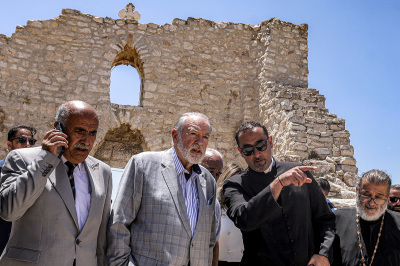
The American Jewish Committee announced in early August a donation of $25,000 to repair Holy Family Church in Gaza City, facilitated by Cardinal Timothy Dolan, Archbishop of New York. The welcome gesture comes after a month of tumult for the relationship between Israel and the Christian world.
Holy Family, the only Catholic church in Gaza, was hit by an Israeli attack on July 17 that tragically killed three civilians sheltering there, leading to criticism of the Israeli government even from staunch allies like President Trump. The IDF issued a rare public apology afterward, indicating that the strike was accidental and that the church was not a target, and announced after an investigation that an errant mortar round had hit the church. Israel further refined its protocols for activity near religious sites.
Prime Minister Benjamin Netanyahu called Pope Leo to apologize for the strike and even granted rare access into Gaza to Christian leaders, including the Catholic Church’s patriarch Cardinal Pizzaballa, who admirably showed his commitment to his flock in the aftermath. Nevertheless, Pizzaballa repeatedly insinuated that the attack was deliberate before any further investigation, reflecting the distrust that has grown in some Christian circles toward Israel.
To speak about the matter bloodlessly, the Holy Family strike was one of the greatest PR disasters Israel has faced to American Christian audiences over the course of the war in Gaza, and it comes amid a series of incidents that could drive a wedge between Israel and Christians near and far.
Tensions flared up between Israeli settlers and Palestinians over the course of July in Taybeh, the only entirely Christian town in the West Bank. Initial news reports that a church had been burned were debunked, but fires broke out between July 7 and 11 and drew the ire of local Christian clergy and the U.S. Ambassador to Israel, Mike Huckabee. Whether Israelis or Palestinians started the fires was disputed, but church leaders blamed Israeli settlers, and another attack in the early hours of July 28 drew similar reactions.
Further conflict between Israel and the Christian community — whether in Israel, Palestine, or elsewhere — could imperil Israel’s support globally and the prospects of long-term peace. Christians in the West, especially the United States, are a major reason for widespread support of Israel’s right to exist and to defend itself. This builds off a shared history between Christians and the Jewish people, as well as the shared Western norms prevalent in both America and Israel. Though Israel is a sovereign nation, it does not exist in a vacuum, and the immense role that U.S. Christians play in Israel’s defense should be recognized. And while much of Israel’s apparent Christian problem is unfortunately the result of anti-Israel bias in the press and among certain groups, it is in Israel’s interest to set the record straight.
In the U.S., we’ve seen antisemitism balloon on the Left, but there is also a small but growing antisemitic contingent on the ostensibly Christian Right. They promote an image of widespread persecution of Christians for their faith by Israel or Jews, despite little evidence of this happening at scale. They rely on isolated tragedies like the Holy Family strike to suggest Jews are fixated on killing Christians. They highlight the bad behavior of individuals or small groups of Jews, such as ultra-Orthodox Jews in Jerusalem spitting on Christian clergy and congregants — behavior that is limited to a small community to begin with and has been regularly prosecuted; condemned when it occurs.
The trend of antisemitism is unacceptable, and ultimate responsibility lies with those who perpetrate it, but Israeli leadership would be foolish not to do its best to self-police anti-Christian behavior when it occurs — particularly as some of Netanyahu’s domestic allies seem ill-prepared to manage Israel’s relationship with Christians at home and abroad.
Nevertheless, some promising steps have already been made in Israel. On July 16, the nation’s Ashkenazi Chief Rabbi and the President of the Chief Rabbinate Council declared the abuse of Christian clergy “absolutely forbidden” and rightly noted that it “undermines and destroys any cooperation between the residents of Israel.” And some American Jews and Christians have taken their own steps toward repairing relations, as the American Jewish Committee’s gift to Holy Family Church shows — coming with the acknowledgement of the Catholic Archdiocese of New York’s assistance in rebuilding homes destroyed in the attacks by Hamas in Israel on October 7, 2023.
Losing significant ground with Christians globally — especially in America — would be an enormous blow to Israel’s own ability to keep itself safe in a dangerous neighborhood. And while some will always remain skeptical, Israel will best serve itself by being as strong of a partner as possible to its Christian allies.
Mike Viola is a Middle East History & Peace Fellow at Young Voices and an incoming MBA candidate. His work has appeared in publications such as the Chicago Tribune, National Review, and the National Interest. Follow him on X and Substack: @mikeviola.














